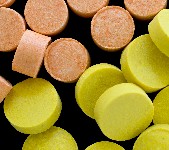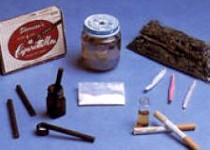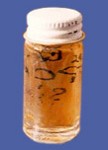   PCP (phencyclidine) was created in the mid-1900's as an intravenous anesthetic for medical purposes, but its use in humans was stopped in 1965 because of the unpleasant side effects. It is still used for treatment of large animals. PCP is a white crystalline powder with a bitter taste, that dissolves in water or alcohol. The drug can be dyed easily, and can be sold illegally as tablets, capsules, a liquid, or coloured powder. It is usually used by snorting it through the nose, smoking, or eating. PCP is often applied to mint, parsley, oregano, or marijuana for smoking. PCP today is illegally manufactured in laboratories and sold on the street under names such as 'angel dust', 'ozone', 'wack', and 'rocket fuel'. PCP is often added to marijuana cigarettes to give them extra 'kick'; these are sold variously as 'Killer joints' or 'crystal supergrass'. The drug causes feelings of strength, power, and invulnerability. Physically, in small doses, it causes a slight increase in breathing rate and a rise in blood pressure and pulse rate. Breathing is shallow, and flushing and profuse sweating occur. Numbness of the extremities and a loss of muscular coordination can also occur. High doses of PCP cause a drop in blood pressure, pulse rate, and respiration, as well as nausea, vomiting, blurred vision, unusual eye movements, drooling, loss of balance, and dizziness. High doses can also result in seizures, coma, and death (although death usually occurs because of accidents caused by PCP intoxication), as well as symptoms similar to those of schizophrenia, such as delusions, hallucinations, paranoia, disordered thinking, and catatonia. Speech is often garbled. Interactions with other depressant drugs taken by the user, such as alcohol, can also lead to coma. PCP is a 'dissociative drug'; it distorts the user's perceptions of sight and sound and produces feelings of detachment (dissociation) from the surroundings. It is addictive; repeated use leads to craving and associated compulsive behaviour. Many users end up being hospitalized because of an overdose, or because of the drug's psychological effects, which can make the user violent and/or suicidal. People who use PCP for a long period of time suffer from memory loss, difficulties with speech and thinking, depression, and weight loss; the symptoms can last for up to a year after stopping PCP use. |